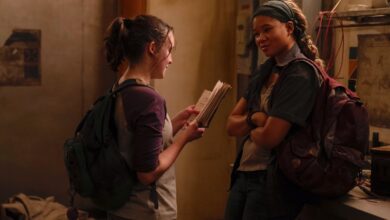House of the Dragon Season 2 Episode 2 Review: Between Revenge and Foresight
Cast: Emma D’Arcy, Olivia Cooke, Ewan Mitchell, Eve Best, Matt Smith, Matthew Needham, Fabien Frankel
Created By: Ryan Condal, George RR Martin
Streaming Platform: Max
Filmyhype.com Ratings: 4/5 (four stars)
This week, House of the Dragon Season 2 Episode 2 continued the bloodshed that began at the end of the first season. A (red) river in flood also characterized the initial opening of last season and can be glimpsed a little in this second. The consequences of “A Son for a Son”, the title of House of the Dragon Season 2 Episode 1, are the basis of the (still) political strategies of this season which for the moment is only putting the pieces in the right place before it is unleashed the real war. Love. Love and death, together. The impulse to create life contrasts with the chaos of self-destruction, generating contrasts in the contrasts of the two sides of the same coin. Love and death like Eros and Thanatos, protagonists in their own way of House of the Dragon Season 2 Episode 2 through the actions and reactions of the various protagonists. Beyond the pleasure principle, as Freud would evoke. Love and death are an ideal synthesis of an episode in which the same factor that characterized the previous one had a central role, albeit with reversed roles: mourning and metabolization. These harbingers of derivations welcome pain in the most disparate ways, speaking a single language even when communication has become impossible.
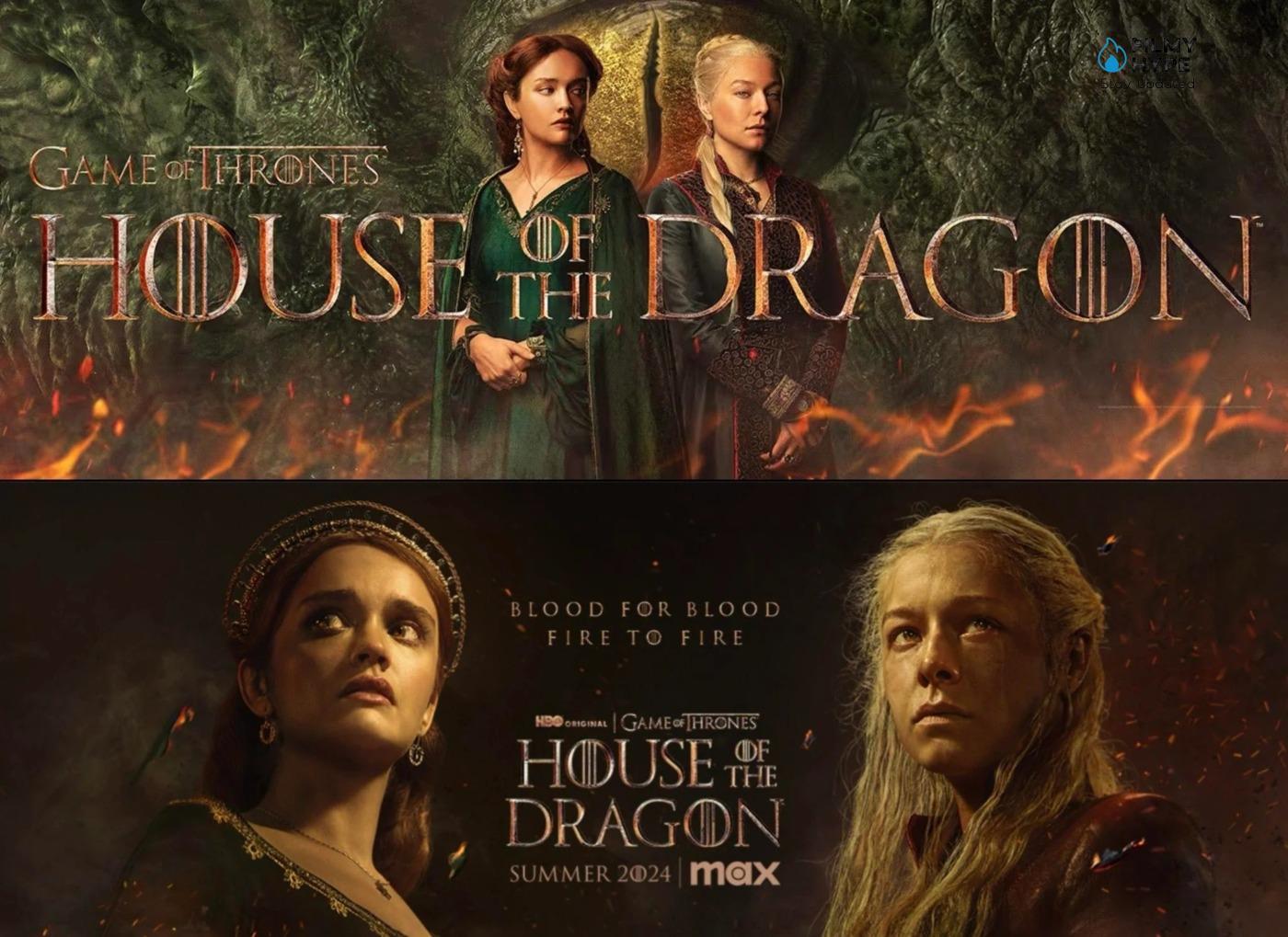
The Dance of the Dragons then reveals itself between the lines of unbridgeable suffering, in which everyone plays a role they would not have wanted, wearing a tragic mask that hides the feeling behind the action. And the fragility behind an apparent strength, a manifesto of the meaning that every war always brings with it. The dragon’s dance. The dance becomes increasingly unbridled and uncontrollable by the individual subjects of an inexhaustible drama, devastated in the darkness of a room close to the rest of the world. Perhaps it is a ploy by the authors, Ryan Condal first and foremost, to show us the approach of the two factions in play for the race for the Iron Throne after the death of King Viserys. But the fact remains that the reactions of Greens and Blacks to what similarly happened to them between the end of the inaugural cycle and the beginning of this second are very different. If Rhaenyra tries at all costs to seek peace after Luke’s death, before officially going to war with the rest of the family, Aegon II’s ( Tom Glynn-Carney ) first instinct is to avenge her son’s death with fire and blood, despite the Small Council advising him to proceed with caution, checking his allies among the various Houses and being sure of being able to beat the competition if they attacked: “I want to spill blood, not ink”) says the young Usurper King, confirming his crazy temperament and his lack of foresight.
House of the Dragon Season 2 Episode 2 Review: The Story Plot
The beginning of the new episode coincides with the end of the last one: Jaehaerys has been killed, the royal guards close the stable when the oxen have escaped and Aegon vents his more than justified anger by destroying the model of Valyria that his father Viserys had commissioned to Bruno Vespa and Doc Emmett Brown (the last part of the sentence may not be true). Aegon threatens war and rain of fire, while the more insanely lucid Aemond finds the secret passage from which Blood and Cheese escaped with the head of the poor little prince, right in the room where he and Cole were planning the attack on the enemies until the interruption of Otto who sent the two to bed (the nephew with a prostitute, the leader of the White Hoods with his daughter), then finds a coin and shows it as if it had some importance, but for now the meaning escapes us and we limit ourselves to note down.
“I will kill them all” the words of King Aegon II resonate throughout King’s Landing, and the most attentive fans of Game of Thrones will perhaps remember that “Burn them all” that King Aerys Targaryen will utter a few centuries later. The event of the death of Jaehaerys, the small future heir to the throne, unleashed the fury of King Aegon II Targaryen, the guilt of Alicent Hightower and Haelena, and the desperation of Otto Hightower overwhelmed by his web of intrigue. Thus begins the witch hunt and once again House of the Dragon places an important emphasis on the mistakes of men which inevitably fall on the women of the family. On the one hand, Alicent and Haelena were forced to participate in the funeral procession of their nephew and son (the Greens who dress in Black), used as a political strategy to clean up the image of the Greens in King’s Landing.
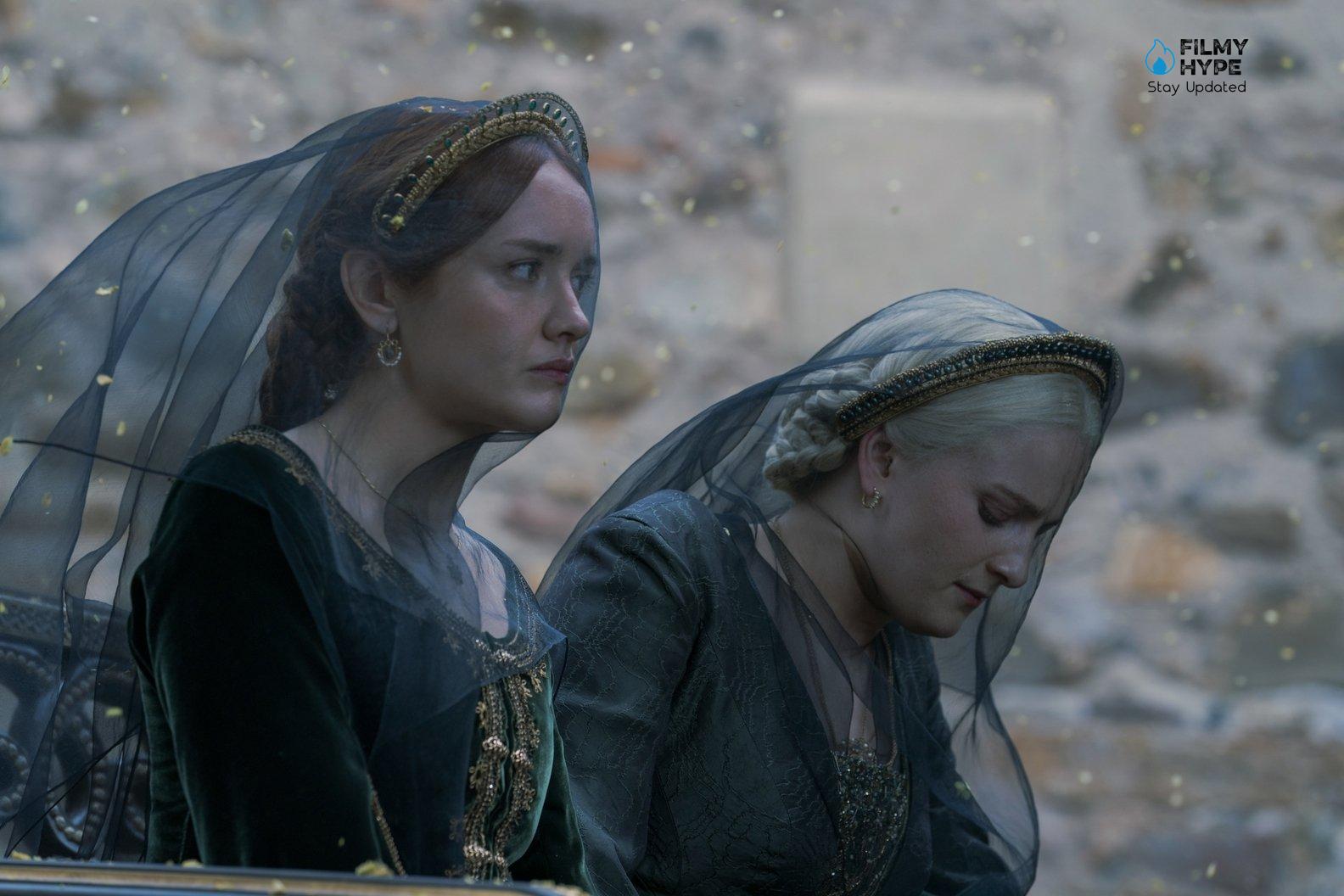
The women are the only ones to bring the face of mourning, as always since ancient times. “The realm must see the pain of the crown. A pain best expressed by her kindest souls”, so while mother and daughter march in the funeral procession the men play at war and once again not with the best results. On the other, Rhaenyra discovers Daemon’s deception: the quarrel between the two Targaryens is a small dance, a brief taste of The Dance of the Dragons, where uncle and nephew, now husband and wife, remove a few pebbles from their shoes. Daemon has never accepted having been symbolically chained to the role of King consort and “betrays” his queen but also establishes the link between Daemon and the castle of Harrenhal. That part of the territory would then be useful to the Blacks to attract even more allies (especially from the North) and to be able to fight the war against the Greens.
House of the Dragon Season 2 Episode 2 Review and Analysis
As we have already said, Rhaenyra the Cruel, the second episode of House of the Dragon Season 2, like the previous one, shakes things up a bit more on a political level than on a tactical level, where in reality there are many errors on both sides. This results in the deaths of the two boys, first Lucerys and now Jaehaerys, at the hands of Daemon and Aemond. It is useful to reflect on the latter and his brother Aagon on their relationship with the maternal figure. In this episode, which is indeed political, flashes of humanity are highlighted by both brothers. Aemond takes refuge in a brothel in King’s Landing, cradled by a prostitute, cradled just as a small child would be cradled. There in the arms of that figure unknown to us, he confesses. He admits for the first time that killing Lucerys was a mistake he regrets. Thus, Aegon instead chooses to mourn his son’s death in silence. Within the walls of his room, he is caught alone by his mother Alicent who doesn’t even want to console him. A mother who abandons both her sons in a moment of lack of clarity. An opposite scene compared to the one between Rhaenyra and Jacaerys after the death of her younger brother is seen in the first episode of House of the Dragon Season 2.
The factor that strongly connects the first episode to the second is one above all: the metabolization of mourning. Lucerys, first. Jaehaerys then. One incident after another – we will return to it – and only one consequence: each of the protagonists finds themselves having to manage a deafening silence amidst the din of the imminent conflict. House of the Dragon Season 2×02, like the first, expertly highlights each canonical phase of mourning management: denial, anger, bargaining, depression, and acceptance. It does so through each of the characters, with an element of continuity that is almost inevitable in such a situation: metabolization requires time and space. The closer the mourning is, the more it asks everyone to stop, for a moment. React through a subjective, gradual perspective aimed at recomposing a rational scenario. This luxury, however, is not granted to the parents and heirs of this dramatic adventure: the weight of responsibilities prevents healthy management of the moment, leading to an explosion of humanity that faces the pressure of events with an endless drift.
A drift that is found in the key elements of the episode, is exposed here:
- Eros and Thanatos
- Faith and science
- Consciousness and unconsciousness
Eros and Thanatos
“There are individuals who in their lives always repeat, without correcting themselves, the same reactions to their detriment, or who even seem to be persecuted by an inexorable destiny, while a closer examination reveals that they unconsciously create this destiny with their own hands. In this case, we attribute a ‘demonic’ character to the repetition compulsion“.
Thus Freud spoke in 1920 in the aforementioned essay Beyond the Pleasure Principle. And it is inevitable to think, immediately, of Daemon Targaryen. His every action is the manifesto of the famous psychoanalyst’s affirmation and is reflected above all in the intense dialogue he has with Rhaenyra during House of the Dragon Season 2 Episode 2. A short but intense dialogue: while the Queen finds in the eyes of her beloved companion the seed of discord, the selfish tendency towards self-destruction that makes any potential bridge impossible, Daemon opens up and reveals to the world the sense of his drift. The timid justifications nor the desire to shift all responsibility onto the assassins he hired to kill the enemy are not enough: Daemon’s ultimate objective was not Aemond, but chaos.
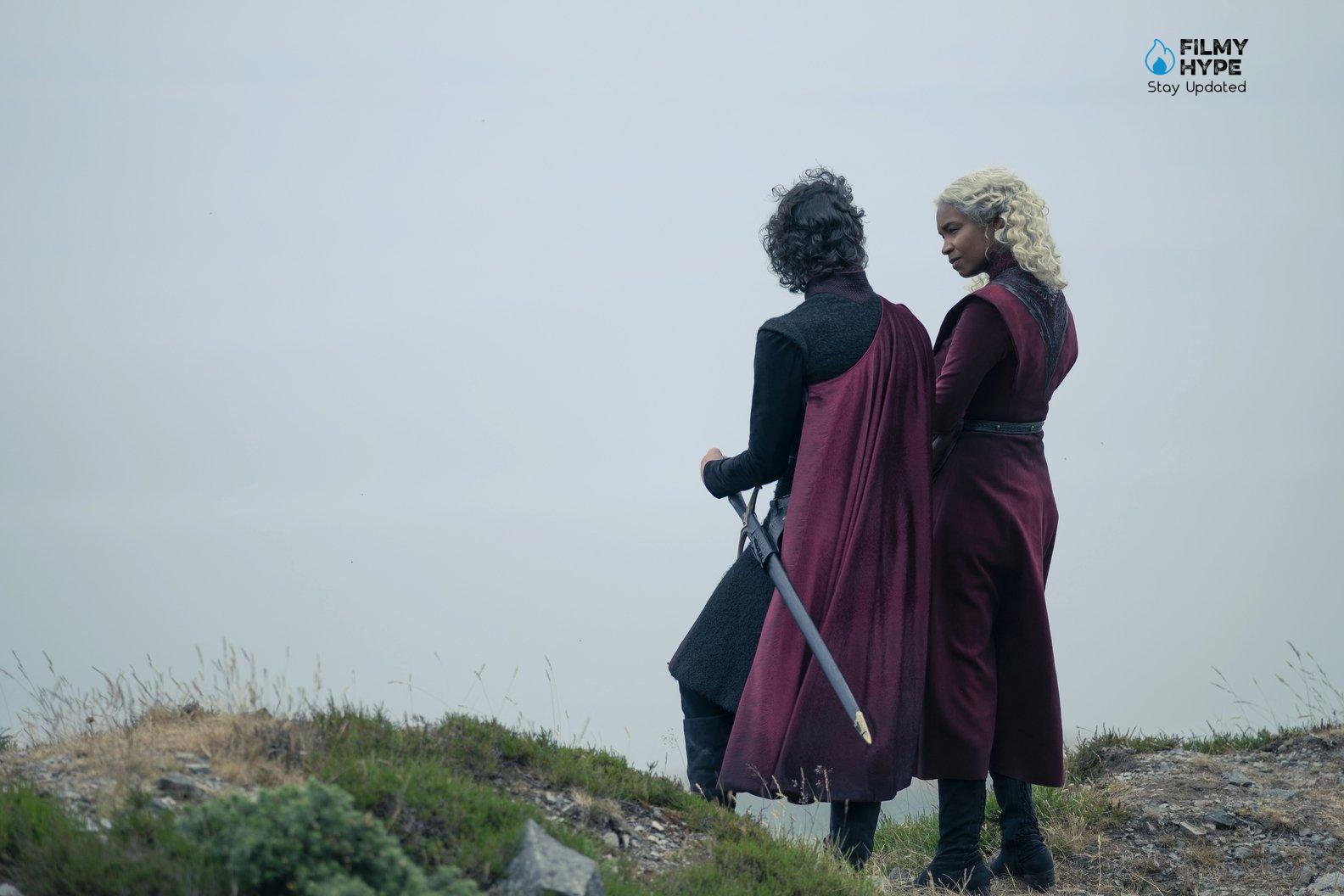
After having exploited the meaning of Rhaenyra’s wishes with a pretext, hypocritically supported by a man who wants nothing more than to be accepted for the monster he is, he removes the mask. And he does it wearing another one, denying that he gave the order for the killing of a child as an alternative to the person directly responsible for Lucerys’ death. Rhaenyra, however, does not believe Daemon’s words: she faces him head-on, finding an insurmountable barrier on the other side. And the awareness that the impurity of their love far exceeds the bonds of blood: it is mainly connected to the inability to coexist needs and visions, distorted and exploited by Daemon for his interests. The only potential outcome of the dialogue is a real absence of dialogue: Rhaenyra finds herself held in a death grip by the man she loves, lucidly. Aware of all this, she still doesn’t know how to reject him: he is the one who runs away, leaving behind the ashes of a world to be destroyed before the world does the same thing to him. It is not the first time, moreover: as the conversation between Rhaenyra and Mysaria later certifies, the man is led to wander within an infernal loop, almost as if he were the favorite child of an imponderable destiny.
Alicent and Cole
Freud again. Still, the love that embraces death in the toxic reciprocity of incurable contradictions. Eros and Thanatos reappear on stage within every expression of the impulses of Criston Cole and Alicent Hightower, linked by a relationship that knows no other truth outside of a sense of freedom: love, however, is none of this. Pleasure is, in their case, an expression of pain and suffering, linked to the events and the dysfunctional vision of Rhaenyra, now the couple’s sworn enemy. Alicent and Cole, protagonists of a relationship that has made much of the House of the Dragon fandom turn up their noses, never share a moment of true sentimental intimacy: it is a moment of physical liberation, the expression of an impulse that connects to animal nature alone. Sexual intercourse is the escape from a reality that the woman cannot face. And this is expressed through the possibility of controlling the actions of a devoted lover, after years in which she had suffered the decisions of others without being able to truly emancipate herself.
All this, however, clashes with the weight of a sense of duty and guilt. A sense of Christian guilt, welcomed by Alicent as well as by Cole with a hypocritical tendency towards emotional reaction that does not match the meaning of their respective actions. When Alicent tries to wash away her sins with a cathartic bath, the second in two episodes, he welcomes her spirituality with a sincere expression. Sincere, but emptied of all meaning when combined with a relationship steeped in toxicity. They know there shouldn’t be a next time, but they both know there will be anyway. The same goes for Cole: he is anchored by the burdens that his oath brings with it, but he is also tainted by the impulses of an irremediably corrupt spirit.
The Darkness of a Mother
A mother’s love and her death are sublimated in the tired shadow of Helaena, who has now surrendered to the tragic burden of fate. Unlike Alicent, she no longer recognizes the sense of duty that her surname imposes on her: she passively suffers an ignoble charade, but she in no way wants to accept it. Haelaena, after the death of her firstborn, is now a ghost. A ghost. The ghost of a work written by a mocking fate. Her figure is intangible, disconnected from any possible connection with anyone else, whether mother or husband: her life ended the moment she handed her son’s life into the hands of an executioner. Her explosion of pain, which arrived amidst the clamor of a crowd trying to caress her hand, is the result of panic and a story that passes before her in an instant. The instant that she stops and crushes the present, the past, and the future in a gaze turned upwards: she is alone and will always be. She doesn’t know how to play the role someone else gave her, and she seems to have no intention of moving in that direction anymore. Love no longer exists there is only room for death, postponed to a later date.
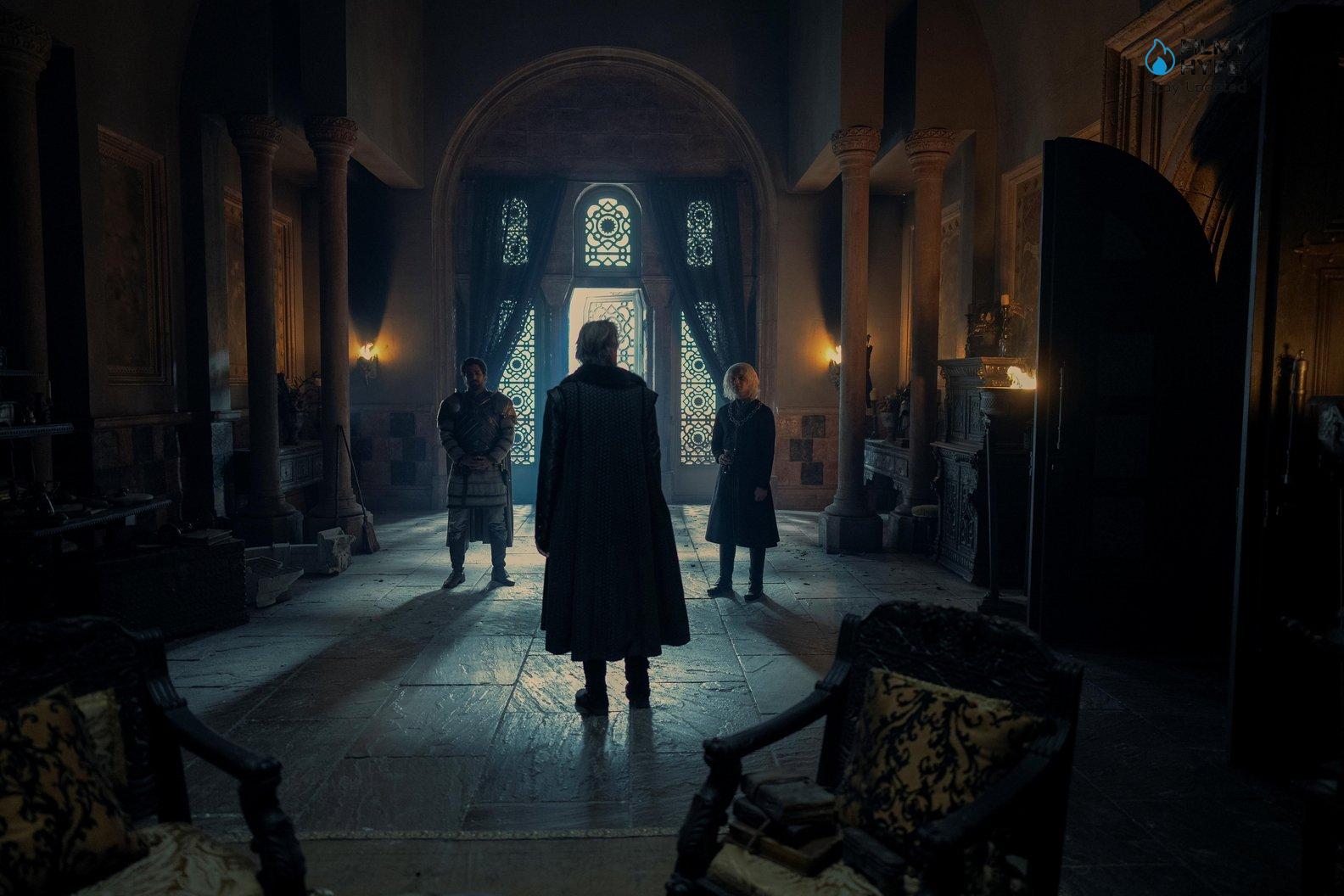
Honor and Dishonor
Love and death, they said. The love of lovers and mothers, but also two twin brothers. Two bodies and a single soul, split by the irrational impulses that lead to war. A war that does not deny love but presents its tragic consequences. Arryk and Erryk Cargyll thus find themselves sharing their last breath after killing each other, in the name of a conflict that is only partly theirs. Love remains, death too: the intense duel for the queen’s life could not fail to end as it did in House of the Dragon Season 2×02. A murder and suicide that closely resembles how the samurai took their own lives after facing dishonor. In the world of Westeros, killing a family member is one of the worst possible crimes. Some react without honor and then there are them: two knights, divided by history but united by an inseparable feeling. Their experience has ended, and their example will remain.
Faith and Science
Another key character of House of the Dragon Season 2 Episode 2 was, undoubtedly, Otto Hightower. The questionable morality of his actions has generated some acrimony towards his name, but he is a necessary figure, to say the least. A son of Machiavelli, always ready to pursue personalistic goals and the kingdom, he serves with the marked ability to make the best of every situation, even the most complex. A ruthlessness that conceals a rare balance within The Dance of the Dragons. His axis, however, crumbles under the blows of a king incapable of seeing beyond his reality, blinded by anger and irrationally driven to unconsciousness. Otto shows that he has metabolized the situation and ends up exploiting the pain of the brutal death of his little nephew, in the name of the kingdom.
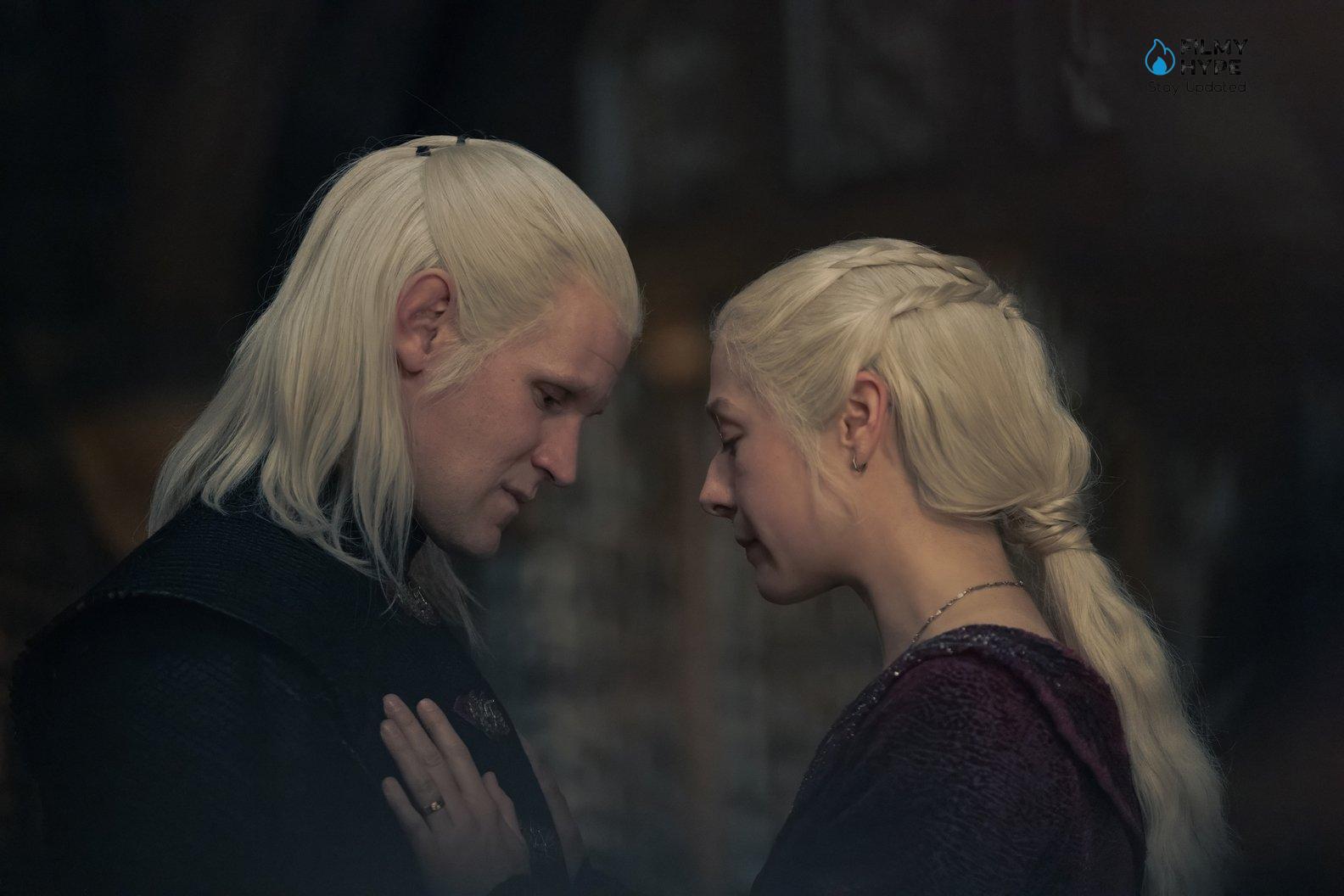
The boundaries of his faith, to which he is bound by the strong bond with Old Town, blur with those of a political science that accepts any potential compromise. His morality is fluid, and his actions are often deplorable, but his vision is clear: Otto is a man of culture who pursues every goal with the power of reason. And he carries within himself the fertility of the Citadel with a hypocritical tendency towards faith, an instrument of power rather than the essence of the spirit. Faith and science find their capital in the same place, led by the Hightowers, and this would be enough to define them in their entirety. The personalism of power, however, ends up ousting him a second time: after being betrayed by his vanity, he is betrayed by the vanity of a short-sighted sovereign.
Consciousness and unconsciousness
If we talk about Otto and his tendency towards conscience, we cannot help but evoke his perfect counterpart: an immature and inexperienced king, devoted to violence to hide his frailties. Aegon reacts to grief by drifting, reserving tears for the only moment he can stop. An unconscious king, chosen by history but not by destiny. Son of chaos, not of fate. The wrong man in the wrong place, prey to impulses and constituent element of a war dominated by episodes written by chance. Aegon’s recklessness thus finds a total incompatibility with Otto’s conduct, and at the same time finds support in the equally inadequate figure of Criston Cole, who became First Knight without having revealed any merit. The Dance of the Dragons, on the other hand, takes shape in the name of recklessness and unwanted choices: this can be said about the deaths of Lucerys and Jaehaerys, but also about the attack on Rhaenyra which led to her death of the Cargyll twins. Chaos now dominates the scene, leaving no room for anything else. And this, as we can imagine, is just the beginning: love and death will still find multiple opportunities to fatally embrace each other, leaving room only for the destruction of an endless war.
The proverbial Targaryen civil war is getting closer not only because one death is rapidly succeeding another. But also, because there is increasingly more friction even within the two factions in the fight for succession to the throne. As soon as Rhaenyra (Emma D’Arcy) learns what happened she becomes furious with Daemon (Matt Smith) and with her acting impulsively she returns forcefully. The screenwriter Sara Hess promised that in this second cycle of episodes, we would better explore the relationship between uncle and nephew: one of the fundamental and most exciting comparisons of this season takes place precisely in this episode and highlights how, despite not wanting it for himself, at the same time it is as if Daemon does not even want the Throne to go to his wife, since he would have liked his brother to have at least proposed it to him. Many years have passed but it is as if he remained there, suspended in time. This element serves to lay the foundation for the character’s new storyline and will return.
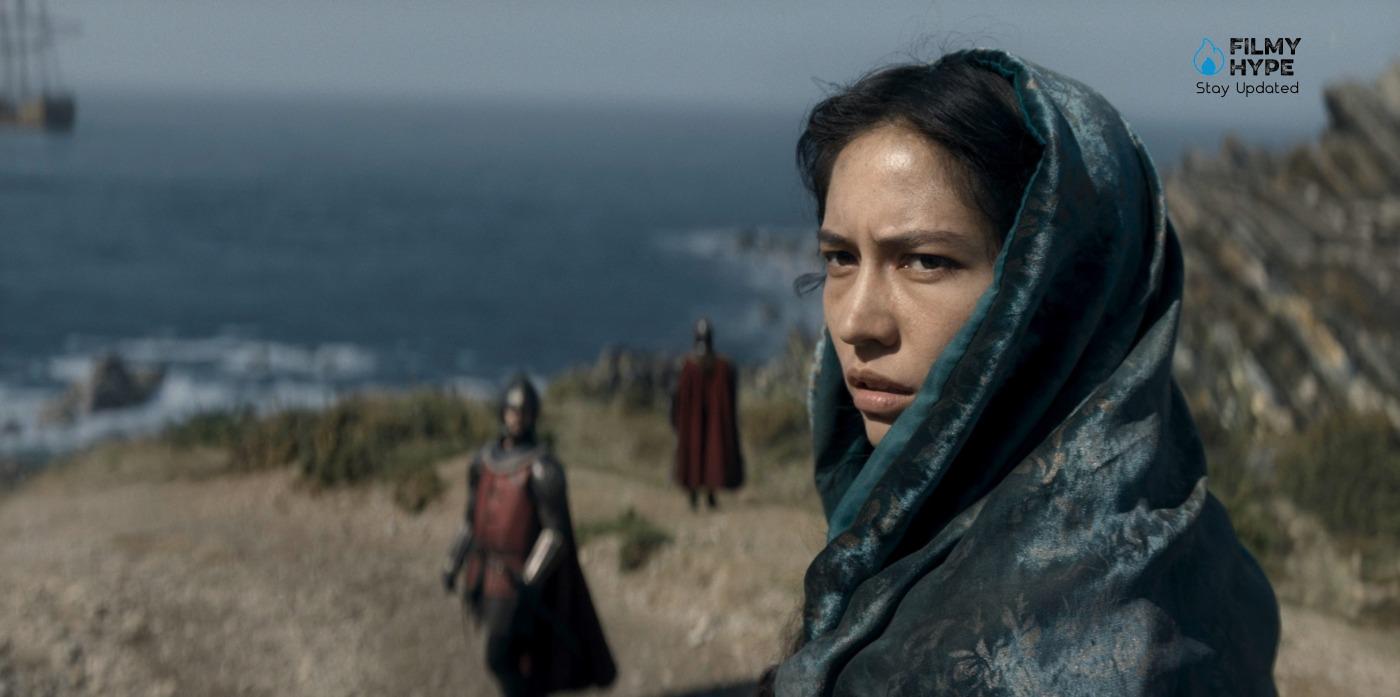
The key emotion of the episode, which is titled The Taking of Harrenhal, is guilt. On the one hand that of Alicent (Olivia Cooke) and Ser Criston (Fabien Frankel) for having been engaged in their secret relationship, leaving the Palace Guard of King’s Landing uncovered and allowing Daemon’s rats to enter undisturbed and killing the little heir. While the former tries to limit the damage, the latter continues to demonstrate his turncoat by sending someone else on a mission to make up for his mistakes. This will lead to an epic and poetic clash that will once again show how defenseless both families are towards external incursions, reminding us how much Martin’s saga is all about palace intrigues and what happens in those ancient corridors of power. On the other hand, Rhaenyra’s sense of guilt for having let everything happen before her eyes, prey to her mourning, hearing herself called a “child killer” by the people. And here comes the confirmation: the good and the bad are even less delineated in this spin-off, anyone is capable of unworthy actions for their gain or for the good of their family. At the same time, there is the feeling of revenge, which blinds many of the protagonists, making them lose their moral compass if they ever had one.
We know how recurrent and revealing brothels are in the world of Game of Thrones. House of the Dragon maintains tradition and confirms its importance through a scene dedicated to Aemond (Ewan Mitchell), in which not only does the actor give a great performance but we also discover more about his sadistic and vengeful character and his complex maternal relationship – it is interesting to note how both he and his brother have an almost absent relationship with Alicent. Not to mention Otto (Rhys Ifans), so busy with his power games that he calmly passes from one nephew to another, just to get something for himself: his ability to always get by in any situation, and continually reinvent himself, cannot remind us of Littlefinger. A son for a son, of course. But also guilt for revenge, officially starting a dangerous cycle of death that will be really complicated to try to stop. The only spineless person in the episode – or rather, in the entire series – is Ser Criston Cole, also known as “the Little Grudge”. After so many years, the man’s pride is still deeply wounded by Rhaenyra’s rejection.
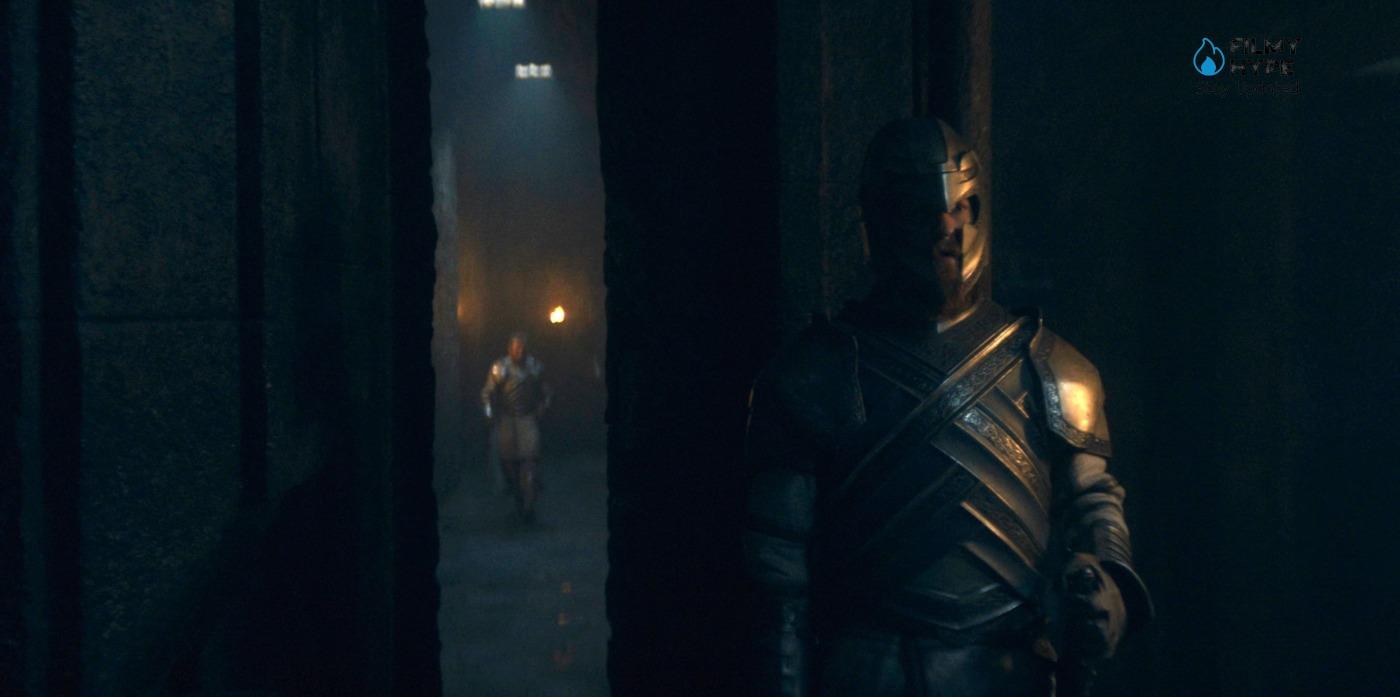
Despite delighting in satisfying the Queen Mother, Alicent Hightower, with his sexual skills, Ser Criston Cole never misses an opportunity to underline his loyalty to Aegon, even going so far as to orchestrate Rhaenyra’s murder by Ser Arryk Cargyll. The daring plan set in motion by Criston Cole does not go as hoped and Rhaenyra is defended by Ser Erryk Cargyll, in a fraternal clash that ends with the death of both men. All this was foreseen by Otto Hightower, who verbally slaps his nephew Aegon, both for the decision to hang all the buggers and for the affront of no longer being Hand of the Knight. Otto confirms Viserys’ opinion of his own son: an uncontrollable, immature, and evil boy, unfit to sit on the throne. Let us remember, however, that it was Otto Hightower himself who secretly plotted not to entrust the Seven Kingdoms to Rhaenyra. Both the Green and Black factions are on a war footing, but both are full of fragility and internal fractures. “There is no war so hateful to the Gods as that between blood relatives. And none are as bloody as those between dragons”, the words of Rhaenys Targaryen are fitting and prophetic.
House of the Dragon Season 2 Episode 2 Review: The Last Words
The second episode of the second season of House of the Dragon (2×02) confirms itself as an important piece that will lead to the so-called Dance of the Dragons. We talk about mourning, managed very differently by the various Targaryens involved, but at the same time indicative of a superhuman malice, and of a sense of guilt that too often rhymes with revenge. At the same time, the characters of Aemond and Otto are explored in depth, among the most calculating in all of Westeros, two “survivors” who look no further than anyone. Blood and ink are the two souls of this episode, only apparently static but full of suspense and twists that prepare the ground for what is to come. Political episode but still interesting especially with regards to the deepening of the interpersonal relationships between the protagonists about the figure of the mother.





